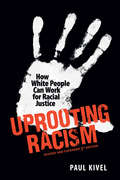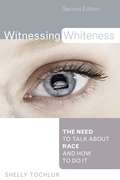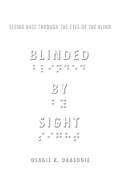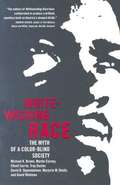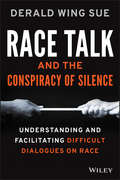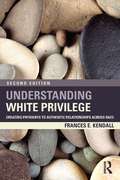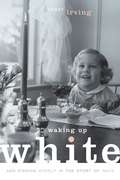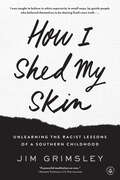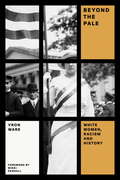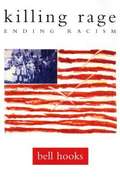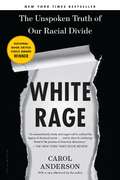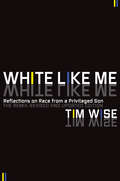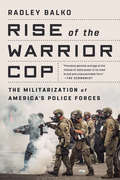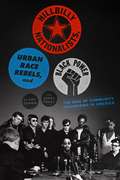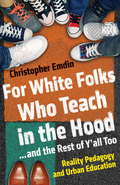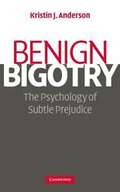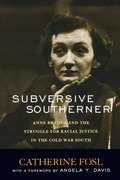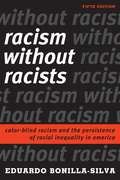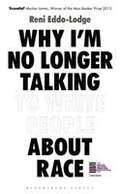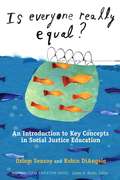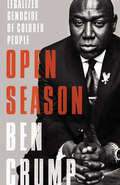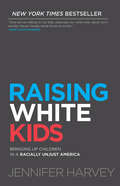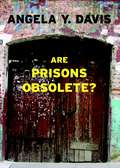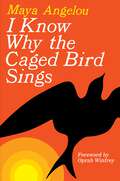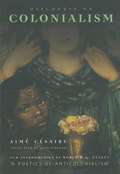Special Collections
Anti-Racism 101
- Table View
- List View
Uprooting Racism
by Paul KivelIn 2008, the United States elected its first black president, and recent polls show that only 22 percent of white people in the US believe that racism is a major societal problem. On the surface, it may seem to be in decline. However the evidence of discrimination persists throughout our society. Segregation and inequalities in education, housing, health care and the job market continue to be the norm. Post 9/11, increased insecurity and fear have led to an epidemic of the scapegoating and harassment of people of color. Uprooting Racism offers a framework for understanding institutional racism. It provides practical suggestions, tools, examples and advice on how white people can intervene in interpersonal and organizational situations to work as allies for racial justice. Completely revised and updated, this expanded third edition directly engages the reader through questions, exercises and suggestions for action, and takes a detailed look at current issues such as affirmative action, immigration and health care. It also includes a wealth of information about specific cultural groups such as Muslims, people with mixed-heritage, Native Americans, Jews, recent immigrants, Asian Americans, and Latino/as. Previous editions of Uprooting Racism have sold more than 50,000 copies. Accessible, personal, supportive and practical, this book is ideal for students, community activists, teachers, youth workers and anyone interested in issues of diversity, multiculturalism and social justice.
Witnessing Whiteness
by Shelly TochlukWitnessing Whiteness invites readers to consider what it means to be white, describes and critiques strategies used to avoid race issues, and identifies the detrimental effect of avoiding race on cross-race collaborations. The author illustrates how racial discomfort leads white people toward poor relationships with people of color. Questioning the implications our history has for personal lives and social institutions, the book considers political, economic, socio-cultural, and legal histories that shaped the meanings associated with whiteness. Drawing on dialogue with well-known figures within education, race, and multicultural work, the book offers intimate, personal stories of cross-race friendships that address both how a deep understanding of whiteness supports cross-race collaboration and the long-term nature of the work of excising racism from the deep psyche. Concluding chapters offer practical information on building knowledge, skills, capacities, and communities that support anti-racism practices, a hopeful look at our collective future, and a discussion of how to create a culture of witnesses who support allies for social and racial justice.
Blinded by Sight
by Osagie K. ObasogieColorblindness has become an integral part of the national conversation on race in America. Given the assumptions behind this influential metaphor—that being blind to race will lead to racial equality—it's curious that, until now, we have not considered if or how the blind "see" race. Most sighted people assume that the answer is obvious: they don't, and are therefore incapable of racial bias—an example that the sighted community should presumably follow.
In Blinded by Sight,Osagie K. Obasogie shares a startling observation made during discussions with people from all walks of life who have been blind since birth: even the blind aren't colorblind—blind people understand race visually, just like everyone else. Ask a blind person what race is, and they will more than likely refer to visual cues such as skin color. Obasogie finds that, because blind people think about race visually, they orient their lives around these understandings in terms of who they are friends with, who they date, and much more.
In Blinded by Sight, Obasogie argues that rather than being visually obvious, both blind and sighted people are socialized to see race in particular ways, even to a point where blind people "see" race. So what does this mean for how we live and the laws that govern our society? Obasogie delves into these questions and uncovers how color blindness in law, public policy, and culture will not lead us to any imagined racial utopia.
Whitewashing Race
by Michael K. Brown and Martin Carnoy and Elliott Currie and Troy Duster and David B. OppenheimerWhite Americans, abetted by neo-conservative writers of all hues, generally believe that racial discrimination is a thing of the past and that any racial inequalities that undeniably persist-in wages, family income, access to housing or health care-can be attributed to African Americans cultural and individual failures. If the experience of most black Americans says otherwise, an explanation has been sorely lacking-or obscured by the passions the issue provokes. At long last offering a cool, clear, and informed perspective on the subject, this book brings together a team of highly respected sociologists, political scientists, economists, criminologists, and legal scholars to scrutinize the logic and evidence behind the widely held belief in a color-blind society-and to provide an alternative explanation for continued racial inequality in the United States. While not denying the economic advances of black Americans since the 1960s, "Whitewashing Race "draws on new and compelling research to demonstrate the persistence of racism and the effects of organized racial advantage across many institutions in American society-including the labor market, the welfare state, the criminal justice system, and schools and universities. Looking beyond the stalled debate over current antidiscrimination policies, the authors also put forth a fresh vision for achieving genuine racial equality of opportunity in a post-affirmative action world.
Race Talk and the Conspiracy of Silence
by Derald Wing SueLearn to talk about race openly, honestly, and productively Most people avoid discussion of race-related topics because ofthe strong emotions and feelings of discomfort that inevitablyaccompany such conversations. Rather than endure the conflict ofracial realities, many people choose instead to avoid the topicaltogether, or remain silent when it is raised. Race Talk andthe Conspiracy of Silence: Understanding and Facilitating DifficultDialogues on Race puts an end to that dynamic by sharingstrategies for smoothing conversations about race in a productivemanner.A guide for facilitating and participating in difficultdialogues about race, author Derald Wing Sue - aninternationally recognized expert on multiculturalism, diversity,and microaggressions - explores the characteristics,dynamics, and meaning behind discussions about race as well as thehidden "ground rules" that inhibit honest and productive dialogue.Through emotional and visceral examples, this book explains whyconversations revolving around racial issues are so difficult, andprovides guidelines, techniques, and advice for navigating andleading honest and forthright discussions. Readers will develop astronger ability to build rapport with people unlike themselves,and discover how not talking about race impacts society as awhole.Overcome and make visible the fears associated with racetalkLearn practical ideas for talking openly about raceFacilitate and navigate discussion with expert strategyExamine the hidden rules that govern race talkUnderstand the benefits of successful conversationsDiscussions about race do not have to result in disastrousconsequences, and can in fact be highly beneficial to all partiesinvolved. It's important that people have the ability to converseopenly and honestly with their students, colleagues, children, andneighbors, and Race Talk provides the path for achievingthis goal.
Understanding White Privilege
by Frances KendallKnowingly and unknowingly we all grapple with race every day. Understanding White Privilege delves into the complex interplay between race, power, and privilege in both organizations and private life. It offers an unflinching look at how ignorance can perpetuate privilege, and offers practical and thoughtful insights into how people of all races can work to break this cycle. Based on thirty years of work in diversity and colleges, universities, and corporations, Frances Kendall candidly invites readers to think personally about how race — theirs and others’ — frames experiences and relationships, focusing squarely on white privilege and its implications for building authentic relationships across race. This much-anticipated revised edition includes two full new chapters, one on white women and another extending the discussion on race. It continues the important work of the first, deepening our knowledge of the recurring history on which cross-race relationships issues exist. Kendall’s book provides readers with a more meaningful understanding of white privilege and equips them with strategies for making personal and organizational changes.
Waking Up White, and Finding Myself in the Story of Race
by Debby IrvingWhite privilege. What is it, what does it mean? For twenty-five years, Debby Irving sensed inexplicable racial tensions in her personal and professional relationships. As a colleague and neighbor, she worried about offending people she dearly wanted to befriend. As an arts administrator, she didn't understand why her diversity efforts lacked traction. As a teacher, she found her best efforts to reach out to students and families of color left her wondering what she was missing. Then, in 2009, one "aha!" moment launched an adventure of discovery and insight that drastically shifted her worldview and upended her life plan. In Waking Up White, Irving tells her often cringe-worthy story with such openness that readers will turn every page rooting for her--and ultimately--for all of us.
How I Shed My Skin
by Jim GrimsleyMore than sixty years ago, the Supreme Court ruled in Brown v. Board of Education that America’s schools could no longer be segregated by race. Critically acclaimed novelist Jim Grimsley was eleven years old in 1966 when federally mandated integration of schools went into effect in the state and the school in his small eastern North Carolina town was first integrated. Until then, blacks and whites didn’t sit next to one another in a public space or eat in the same restaurants, and they certainly didn’t go to school together. Going to one of the private schools that almost immediately sprang up was not an option for Jim: his family was too poor to pay tuition, and while they shared the community’s dismay over the mixing of the races, they had no choice but to be on the front lines of his school’s desegregation. What he did not realize until he began to meet these new students was just how deeply ingrained his own prejudices were and how those prejudices had developed in him despite the fact that prior to starting sixth grade, he had actually never known any black people. Now, more than forty years later, Grimsley looks back at that school and those times--remembering his own first real encounters with black children and their culture. The result is a narrative both true and deeply moving. Jim takes readers into those classrooms and onto the playing fields as, ever so tentatively, alliances were forged and friendships established. And looking back from today’s perspective, he examines how far we have really come.
Beyond the Pale
by Vron Ware and Mikki KendallHow have ideas about white women figured in the history of racism? Vron Ware argues that they have been central, and that feminism has, in many ways, developed as a political movement within racist societies. Dissecting the different meanings of femininity and womanhood, Beyond the Pale examines the political connections between black and white women, both within contemporary racism and feminism, as well as in historical examples like the anti-slavery movement and the British campaign against lynching in the United States. Beyond the Pale is a major contribution to anti-racist work, confronting the historical meanings of whiteness as a way of overcoming the moralism that so often infuses anti-racist movements.From the Trade Paperback edition.
Killing Rage
by Bell HooksOne of our country's premier cultural and social critics, Bell Hooks has always maintained that eradicating racism and eradicating sexism must go hand in hand. These twenty-three essays are written from a black and feminist perspective, and they tackle the bitter difficulties of racism by envisioning a world without it. They address a spectrum of topics having to do with race and racism in the United States: psychological trauma among African Americans; friendship between black women and white women; anti-Semitism and racism; and internalized racism in movies and the media. And in the title essay, Hooks writes about the "Killing Rage" -- the fierce anger of black people stung by repeated instances of everyday racism -- finding in that rage a healing source of love and strength and a catalyst for positive change.
White Rage
by Carol AndersonFrom the end of the Civil War to our combustible present, an acclaimed historian reframes the conversation about race we must continue to have, chronicling the powerful forces that have long opposed black progress in America.
As Ferguson, Missouri, erupted in August 2014, with media commentators referring to the angry response of African Americans yet again as "black rage," historian Carol Anderson wrote a remarkable op-ed in the Washington Post showing that this was, instead, "white rage" at work. "With so much attention on the flames," she writes, "everyone had ignored the kindling."
Now, in her eloquent and powerfully argued narrative, Anderson makes clear that since 1865 and the passage of the Thirteenth Amendment, every time African Americans have made advances toward full participation in our democracy, white reaction--usually in the courts and legislatures--has fueled a deliberate and relentless rollback of their gains.
The end of the Civil War and Reconstruction was greeted with the Black Codes and Jim Crow.
The Great Migration north was physically opposed in many Southern states, and blacks often found conditions in the North to be no better. The Supreme Court's landmark 1954 Brown v. Board of Education decision was met with the shutting down of public schools throughout the South while taxpayer dollars financed segregated white private schools.
The Civil Rights Act of 1964 and Voting Rights Act of 1965 triggered a coded but powerful response--the so-called Southern Strategy and the War on Drugs that disenfranchised and imprisoned millions of African Americans.
The election of Barack Obama, and the promise it heralded of healing our racial divide, precipitated instead a rash of voter suppression laws in Southern and swing states, while the Supreme Court's decision in Shelby County v. Holder gutted a key provision of the Voting Rights Act.
Carefully linking these and other historical flash points when social progress for African Americans was countered by deliberate and cleverly crafted white opposition, Anderson pulls back the veil that has long covered punitive actions allegedly made in the name of protecting democracy, fiscal responsibility, or protection against fraud.
Compelling and dramatic in the unimpeachable history it relates over a century and a half, White Rage will add an important new dimension to the national conversation about race in America.
A New York Times Bestseller
White Like Me
by Tim WiseWith a new preface and updated chapters, White Like Me is one-part memoir, one-part polemical essay collection. It is a personal examination of the way in which racial privilege shapes the daily lives of white Americans in every realm: employment, education, housing, criminal justice, and elsewhere.Using stories from his own life, Tim Wise demonstrates the ways in which racism not only burdens people of color, but also benefits, in relative terms, those who are "white like him." He discusses how racial privilege can harm whites in the long run and make progressive social change less likely. He explores the ways in which whites can challenge their unjust privileges, and explains in clear and convincing language why it is in the best interest of whites themselves to do so. Using anecdotes instead of stale statistics, Wise weaves a narrative that is at once readable and yet scholarly, analytical and yet accessible.
Rise of the Warrior Cop
by Radley BalkoThe last days of colonialism taught America's revolutionaries that soldiers in the streets bring conflict and tyranny. As a result, our country has generally worked to keep the military out of law enforcement. But according to investigative reporter Radley Balko, over the last several decades, America's cops have increasingly come to resemble ground troops. The consequences have been dire: the home is no longer a place of sanctuary, the Fourth Amendment has been gutted, and police today have been conditioned to see the citizens they serve as an other-an enemy.Today's armored-up policemen are a far cry from the constables of early America. The unrest of the 1960s brought about the invention of the SWAT unit-which in turn led to the debut of military tactics in the ranks of police officers. Nixon's War on Drugs, Reagan's War on Poverty, Clinton's COPS program, the post-9/11 security state under Bush and Obama: by degrees, each of these innovations expanded and empowered police forces, always at the expense of civil liberties. And these are just four among a slew of reckless programs.In Rise of the Warrior Cop, Balko shows how politicians' ill-considered policies and relentless declarations of war against vague enemies like crime, drugs, and terror have blurred the distinction between cop and soldier. His fascinating, frightening narrative shows how over a generation, a creeping battlefield mentality has isolated and alienated American police officers and put them on a collision course with the values of a free society.
Hillbilly Nationalists, Urban Race Rebels, and Black Power
by James Tracy and Amy SonnieTHE STORY OF SOME OF THE MOST IMPORTANT AND LITTLE-KNOWN ACTIVISTS OF THE 1960s, IN A DEEPLY SOURCED NARRATIVE HISTORY The historians of the late 1960s have emphasized the work of a group of white college activistss who courageously took to the streets to protest the war in Vietnam and continuing racial inequality. Poor and working-class whites have tended to be painted as spectators, reactionaries, and, even, racists. Most Americans, the story goes, just watched the political movements of the sixties go by. James Tracy and Amy Sonnie, who have been interviewing activists from the era for nearly ten years, reject this old narrative. They show that poor and working-class radicals, inspired by the Civil Rights movement, the Black Panthers, and progressive populism, started to organize significant political struggles against racism and inequality during the 1960s and 1970s. Among these groups: > JOIN Community Union brought together southern migrants, student radicals, and welfare recipients in Chicago to fight for housing, health, and welfare . . . > The Young Patriots Organization and Rising Up Angry organized self-identified hillbillies, Chicago greasers, Vietnam vets, and young feminists into a legendary "Rainbow Coalition" with Black and Puerto Rican activists . . . > In Philadelphia, the October 4th Organization united residents of industrial Kensington against big business, war, and a repressive police force . . . > In the Bronx, White Lightning occupied hospitals and built coalitions with doctors to fight for the rights of drug addicts and the poor. Exploring an untold history of the New Left, the book shows how these groups helped to redefine community organizing--and transforms the way we think about a pivotal moment in U.S. history.From the Trade Paperback edition.
For White Folks Who Teach in the Hood ... and the Rest of Y'all Too
by Christopher EmdinMerging real stories with theory, research, and practice, a prominent scholar offers a new approach to teaching and learning for every stakeholder in urban education.
Drawing on his own experience of feeling undervalued and invisible in classrooms as a young man of color and merging his experiences with more than a decade of teaching and researching in urban America, award-winning educator Christopher Emdin offers a new lens on an approach to teaching and learning in urban schools.
He begins by taking to task the perception of urban youth of color as unteachable, and he challenges educators to embrace and respect each student's culture and to reimagine the classroom as a site where roles are reversed and students become the experts in their own learning.
Putting forth his theory of Reality Pedagogy, Emdin provides practical tools to unleash the brilliance and eagerness of youth and educators alike--both of whom have been typecast and stymied by outdated modes of thinking about urban education.
With this fresh and engaging new pedagogical vision, Emdin demonstrates the importance of creating a family structure and building communities within the classroom, using culturally relevant strategies like hip-hop music and call-and-response, and connecting the experiences of urban youth to indigenous populations globally.
Merging real stories with theory, research, and practice, Emdin demonstrates how by implementing the "Seven C's" of reality pedagogy in their own classrooms, urban youth of color benefit from truly transformative education.
Lively, accessible, and revelatory, For White Folks Who Teach in the Hood. . . and the Rest of Y'all Too is the much-needed antidote to traditional top-down pedagogy and promises to radically reframe the landscape of urban education for the better.
Benign Bigotry
by Kristin J. AndersonWhile overt prejudice is now much less prevalent than in decades past, subtle prejudice - prejudice that is inconspicuous, indirect, and often unconscious - continues to pervade our society. Laws do not protect against subtle prejudice and, because of its covert nature, it is difficult to observe and frequently goes undetected by both perpetrator and victim. Benign Bigotry uses a fresh, original format to examine subtle prejudice by addressing six commonly held cultural myths based on assumptions that appear harmless but actually foster discrimination: 'those people all look alike'; 'they must be guilty of something'; 'feminists are man-haters'; 'gays flaunt their sexuality'; 'I'm not a racist, I'm color-blind' and 'affirmative action is reverse racism'. Kristin J. Anderson skillfully relates each of these myths to real world events, emphasizes how errors in individual thinking can affect society at large, and suggests strategies for reducing prejudice in daily life.
Subversive Southerner
by Catherine Foslmccarty braden is a southern white woman who in the 1940s broke from her segregationist past and became a lifelong crusader to awaken the white southerners to racial injustice.
Racism Without Racists
by Eduardo Bonilla-SilvaEduardo Bonilla-Silva's acclaimed Racism without Racists documents how, beneath our contemporary conversation about race, there lies a full-blown arsenal of arguments, phrases, and stories that whites use to account for--and ultimately justify--racial inequalities.
The fifth edition of this provocative book makes clear that color blind racism is as insidious now as ever.
It features new material on our current racial climate, including the Black Lives Matter movement; a significantly revised chapter that examines the Obama presidency, the 2016 election, and Trump's presidency; and a new chapter addressing what readers can do to confront racism--both personally and on a larger structural level.
Why I'm No Longer Talking To White People About Race
by Reni Eddo-LodgeIn 2014, award-winning journalist Reni Eddo-Lodge wrote about her frustration with the way that discussions of race and racism in Britain were being led by those who weren’t affected by it. She posted a piece on her blog, entitled: "Why I’m No Longer Talking to White People About Race."
Her words hit a nerve. The post went viral and comments flooded in from others desperate to speak up about their own experiences. Galvanized by this clear hunger for open discussion, she decided to dig into the source of these feelings. Exploring issues from eradicated black history to the political purpose of white dominance, whitewashed feminism to the inextricable link between class and race, Reni Eddo-Lodge offers a timely and essential new framework for how to see, acknowledge and counter racism. It is a searing, illuminating, absolutely necessary exploration of what it is to be a person of color in Britain today.
Is Everyone Really Equal? An Introduction to Key Concepts in Social Justice Education
by Özlem Sensoy and Robin DiangeloThis practical handbook will introduce readers to social justice education, providing tools for developing "critical social justice literacy" and for taking action towards a more just society. Accessible to students from high school through graduate school, this book offers a collection of detailed and engaging explanations of key concepts in social justice education, including critical thinking, privilege, and White supremacy. Based on extensive experience in a range of settings in the United States and Canada, the authors address the most common stumbling blocks to understanding social justice. They provide recognizable examples, scenarios, and vignettes illustrating these concepts. This unique resource has many user-friendly features, including "definition boxes" for key terms, "stop boxes" to remind readers of previously explained ideas, "perspective check boxes" to draw attention to alternative standpoints, a glossary, and a chapter responding to the most common rebuttals encountered when leading discussions on concepts in critical social justice. There are discussion questions and extension activities at the end of each chapter, and an appendix designed to lend pedagogical support to those newer to teaching social justice education.
Open Season
by Ben CrumpGenocide—the intent to destroy in whole or in part, a group of people.In Open Season, award-winning attorney Ben Crump exposes a heinous truth: Whether with a bullet or a lengthy prison sentence, America is killing black people and justifying it legally. While some deaths make headlines, most are personal tragedies suffered within families and communities. Worse, these killings are done one person at a time, so as not to raise alarm. While it is much more difficult to justify killing many people at once, in dramatic fashion, the result is the same—genocide.Taking on such high-profile cases as Trayvon Martin, Michael Brown, and a host of others, Crump witnessed the disparities within the American legal system firsthand and learned it is dangerous to be a black man in America—and that the justice system indeed only protects wealthy white men.In this enlightening and enthralling work, he shows that there is a persistent, prevailing, and destructive mindset regarding colored people that is rooted in our history as a slaveowning nation. This biased attitude has given rise to mass incarceration, voter disenfranchisement, unequal educational opportunities, disparate health care practices, job and housing discrimination, police brutality, and an unequal justice system. And all mask the silent and ongoing systematic killing of people of color. Open Season is more than Crump’s incredible mission to preserve justice, it is a call to action for Americans to begin living up to the promise to protect the rights of its citizens equally and without question.
Raising White Kids
by Jennifer HarveyRaising White Kids is a book for families, churches, educators and communities who want to equip their children to be active and able participants in a society that is becoming one of the most racially diverse in the world while remaining full of racial tensions. For white people who are committed to equity and justice, living in a nation that remains racially unjust and deeply segregated creates unique conundrums.
These conundrums begin early in life and impact the racial development of white children in powerful ways. What can we do within our homes, communities and schools? Should we teach our children to be “colorblind”? Or, should we teach them to notice race? What roles do we want to equip them to play in addressing racism when they encounter it? What strategies will help our children learn to function well in a diverse nation?
Talking about race means naming the reality of white privilege and hierarchy. How do we talk about race honestly, then, without making our children feel bad about being white? Most importantly, how do we do any of this in age-appropriate ways?
While a great deal of public discussion exists in regard to the impact of race and racism on children of color, meaningful dialogue about and resources for understanding the impact of race on white children are woefully absent. Raising White Kids steps into that void.
A New York Times Bestseller
Are Prisons Obsolete?
by Angela Y. DavisWith her characteristic brilliance, grace and radical audacity, Angela Y. Davis has put the case for the latest abolition movement in American life: the abolition of the prison. As she quite correctly notes, American life is replete with abolition movements, and when they were engaged in these struggles, their chances of success seemed almost unthinkable. For generations of Americans, the abolition of slavery was sheerest illusion. Similarly,the entrenched system of racial segregation seemed to last forever, and generations lived in the midst of the practice, with few predicting its passage from custom. The brutal, exploitative (dare one say lucrative?) convict-lease system that succeeded formal slavery reaped millions to southern jurisdictions (and untold miseries for tens of thousands of men, and women). Few predicted its passing from the American penal landscape. Davis expertly argues how social movements transformed these social, political and cultural institutions, and made such practices untenable.In Are Prisons Obsolete?, Professor Davis seeks to illustrate that the time for the prison is approaching an end. She argues forthrightly for "decarceration", and argues for the transformation of the society as a whole.
I Know Why the Caged Bird Sings
by Maya AngelouHere is a book as joyous and painful, as mysterious and memorable, as childhood itself. I Know Why the Caged Bird Sings captures the longing of lonely children, the brute insult of bigotry, and the wonder of words that can make the world right. Maya Angelou&’s debut memoir is a modern American classic beloved worldwide. Sent by their mother to live with their devout, self-sufficient grandmother in a small Southern town, Maya and her brother, Bailey, endure the ache of abandonment and the prejudice of the local &“powhitetrash.&” At eight years old and back at her mother&’s side in St. Louis, Maya is attacked by a man many times her age—and has to live with the consequences for a lifetime. Years later, in San Francisco, Maya learns that love for herself, the kindness of others, her own strong spirit, and the ideas of great authors (&“I met and fell in love with William Shakespeare&”) will allow her to be free instead of imprisoned. Poetic and powerful, I Know Why the Caged Bird Sings will touch hearts and change minds for as long as people read. &“I Know Why the Caged Bird Sings liberates the reader into life simply because Maya Angelou confronts her own life with such a moving wonder, such a luminous dignity.&”—James Baldwin
Discourse on Colonialism
by Aime Cesaire and Joan Pinkham and Robin D. G. Kelley and Rene DepestreThis classic work, first published in France in 1955, profoundly influenced the generation of scholars and activists at the forefront of liberation struggles in Africa, Latin America, and the Caribbean. Nearly twenty years later, when published for the first time in English, Discourse on Colonialism inspired a new generation engaged in the Civil Rights, Black Power, and anti-war movements and has sold more than 75,000 copies to date.
